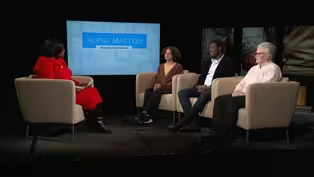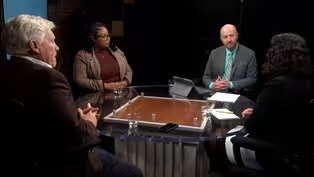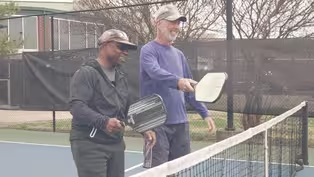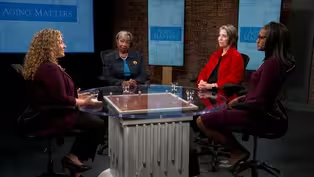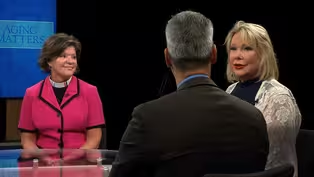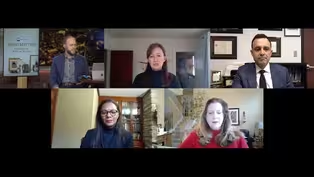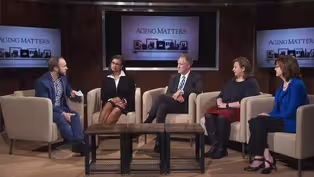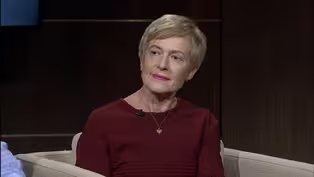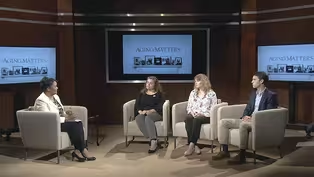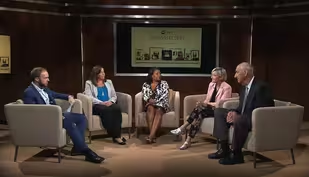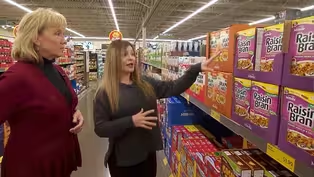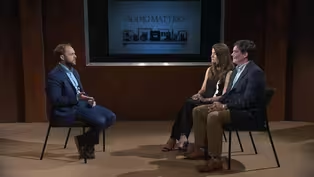
Long-Term Care: Know Your Options
Special | 26m 46sVideo has Closed Captions
A conversation exploring long-term care options in Tennessee and their affordability.
By 2030, nearly a third of Tennessee's population will be over age 60, and a majority will need some form of long-term care during their lifetimes. Join Nashville Public Television as we convene a group of experts to discuss various paths to care. Moderated by Blake Farmer, Nashville Public Radio's senior health reporter.
Problems playing video? | Closed Captioning Feedback
Problems playing video? | Closed Captioning Feedback
Aging Matters is a local public television program presented by WNPT

Long-Term Care: Know Your Options
Special | 26m 46sVideo has Closed Captions
By 2030, nearly a third of Tennessee's population will be over age 60, and a majority will need some form of long-term care during their lifetimes. Join Nashville Public Television as we convene a group of experts to discuss various paths to care. Moderated by Blake Farmer, Nashville Public Radio's senior health reporter.
Problems playing video? | Closed Captioning Feedback
How to Watch Aging Matters
Aging Matters is available to stream on pbs.org and the free PBS App, available on iPhone, Apple TV, Android TV, Android smartphones, Amazon Fire TV, Amazon Fire Tablet, Roku, Samsung Smart TV, and Vizio.
Providing Support for PBS.org
Learn Moreabout PBS online sponsorshipMore from This Collection
Learn more about the issues facing an aging population from a panel of experts and community members discussing various topics on aging for Nashville Public Television original series NPT Reports: Aging Matters.
Raised by Grandparents Panel Discussion
Video has Closed Captions
Individuals discuss both the challenges and the benefits of being raised by grandparents. (25m 8s)
Affordable Housing in Nashville
Video has Closed Captions
As the cost of housing surges in Nashville, we pause to consider a more affordable future. (26m 46s)
Video has Closed Captions
A discussion about making the most of our time and abilities as we age. (26m 46s)
Video has Closed Captions
Experts discuss what has to change to give older women the quality of life they deserve. (26m 46s)
LGBTQIA+ Resources in Middle Tennessee
Video has Closed Captions
A discussion of health and social services available for older Middle TN LGBTQIA+ adults. (26m 46s)
Video has Closed Captions
Experts discuss how older adults can stay safer-at-home during the COVID-19 pandemic. (27m 9s)
Legal Help Panel Discussion | Aging Matters | NPT Reports
Video has Closed Captions
NPT’s Aging Matters: Legal Help sheds light on resources for legal assistance. (27m 24s)
Hospitals & Health Risks Panel Discussion | Aging Matters
Video has Closed Captions
A panel of experts discusses strategies for a safe hospital stay. (28m 39s)
Loneliness & Isolation Panel Discussion | Aging Matters
Video has Closed Captions
Brent Elrod, Gretchen Funk and Andrea Prince discuss issues of loneliness and isolation. (28m 32s)
Dental Health Panel Discussion | Aging Matters
Video has Closed Captions
Experts discuss SMILE ON 60+, an initiative aiming to improve oral health in older adults. (27m 16s)
Video has Closed Captions
Aging Matters: Practical Nutrition offers simple tips and advice. (28m 31s)
Aging & the Workplace Panel Discussion | Aging Matters | NPT
Video has Closed Captions
Aging & the Workplace Panel Discussion (32m 59s)
Providing Support for PBS.org
Learn Moreabout PBS online sponsorship(light music) - [Announcer] Major funding for Aging Matters is provided by the West End Home Foundation, enriching the lives of older adults through grantmaking, advocacy, and community collaboration.
The Jeanette Travis Foundation, dedicated to improving the health and wellbeing of the Middle Tennessee Community.
The HCA Healthcare Foundation, on behalf of TriStar Health.
Cigna, together all the way.
Additional funding provided by Jackson National Life Insurance Company, the Community Foundation of Middle Tennessee, and by members of NPT.
Thank you.
- Long-term care is a subject that many may be tempted to avoid.
Nobody dreams of spending part of their golden years in a nursing home.
But 70% of us will need some form of long-term services.
Planning for that moment may in fact preserve independence and ensure our wellbeing, but there are options, which is what we're here to talk about.
I'm Blake Farmer, Senior Healthcare Reporter for Nashville Public Radio.
Our guests this hour are Travenia A Holden, Elder Law Attorney at Holden Law Office, Dr. Kendall Brune, Managing Partner for AnthemCare Tennessee, Dalih Suchet, Certified Long-term Care Specialist at White Hall Benefits, and Shawn Anfinson, a Producer for NPT's Aging Matters series.
And Shawn, we'll start with you.
You just produced a documentary titled "Re-imagining Long-term Care."
So I'll just ask, what did you learn?
- Well, thank you, Blake.
And a special thanks to Nashville Public Radio for sharing you and your talents as moderator of this discussion.
So here's what I found while working on our most recent Aging Matters documentary, which is called "Re-imagining Long-term Care."
Things like nursing home care and in-home health aides are very expensive, especially for the average family.
And to compound matters, there seems to be a lot of misperceptions around things like Medicare and Medicaid, what those benefits do and don't cover, and who qualifies.
In fact, I think we have some footage from the show that highlights this very point.
- Yeah, well, let's take a look.
- There is a huge deficit around that middle income bracket as far as funding and programs available to meet their needs.
So what we have is people having to shift that burden to their family, the family taking on that responsibility.
There was a point where I was simply overwhelmed, and certainly I had what I considered to be a whale sourced library of knowledge on long-term services and support, as well as a network of folks that I could call and ask questions, and was very familiar with how the system worked.
But it moved me from being a professional to being a daughter with the emotions, but still needing to make sure that their needs are being met.
One evening, driving back from Lewisburg.
I actually concluded that no one knew how challenged I was and that I was the equivalent of a tree falling in the forest and no one knew.
- [Narrator] Here in the United States, nearly one in five people are unpaid family caregivers, and they're providing 80% of long-term care at home that unpaid care comes at a cost.
In 2017, most family caregivers spent an average of $7,000 out of pocket, and that doesn't account for thousands in lost wages from missed work.
- We fail family caregivers because we don't provide enough support that allowed them to remain viable in the community as they were and a contributing member of the community because of the time that is associated with the family caregiving role.
And so we see chronic conditions become a problem or exacerbated or new conditions are identified as a result of the stress and the lack of sleep that goes with family caregiving.
- [Narrator] Like Harris, many families are unprepared for the real cost of long-term care.
And some assume that Medicare will pick up the tab, but according to Grace Smith with AgeWell Tennessee, that's largely false.
- There are two things that I think are important to keep in mind as we talk about paying for long-term care.
One is the misperception that Medicare covers long-term care expenses.
It covers some expenses on a limited basis.
For example, nursing home care for rehab after a fall or hip replacement surgery, limited care for a limited amount of time.
- Well, some Medicare advantage plans, are now offering a limited variety of supplemental home and community-based services.
Traditional Medicare does not cover long-term services and supports.
- There are basically three main ways you can cover those costs.
It's private pay, long-term care insurance, but only 7% of people, 50 and older have long-term care insurance.
And then there are state Medicaid programs, which you basically have to spend down your resources and qualify medically to be covered by Medicaid.
And for the majority of us, we're not going to qualify for Medicaid.
- So that from the latest installment on the Aging Matters series here on NPT and a lot to chew on and a warning here, we're really just gonna scratch surface here with our panel.
But hopefully we can begin to bring a little bit of clarity here.
And I wanna start with this conversation about Medicaid and the misconception that folks might have Medicaid pay for them to be in a nursing home.
And Travenia Holden, I'd like to start with you, can you start by explaining who should be considered or considering Medicaid as an option to pay for nursing home care, assuming they don't already qualify for Medicaid somehow.
- There are technically three criteria, for qualifying for Medicaid.
There's the technical criteria, which is usually no one has a problem with that.
Someone is over 65, they are applying for Medicaid in the county or resonance.
They are a U.S. citizen or illegal alien.
The second part is they have to meet the medical criteria in that they have to meet levels of care.
And that levels of care usually deals with their activities of daily living, like being able to feed themselves, to transfer, to walk, eat, and dress.
And then they also have to have the functional criteria.
Another misconception with the medical is that someone that has lost capacity like someone with dementia or Alzheimer's that they're automatically gonna qualify and they're not.
And then the third criteria is financial and in Tennessee, it's a two-step process and this is where individuals get confused.
There's income and in Tennessee, there's an income cap.
And so you cannot have income over 2,523 for 2022, and you cannot have assets over $2,000.
- Well, so this brings us to this term that we heard spend down.
When someone talks about a Medicaid spend down, what are they referring to?
- They are referring to any assets that are over $2,000.
And if an individual has that they can not qualify for Medicaid.
So when you talk about spin down, it literally means that you're spending down those assets.
Now I am not an elder law attorney that believes in spending for the sake of spending.
I think that that should be a plan.
I think that that should involve some very informed decision-making.
There are some exceptions to that spend down like, for example, your house is an exempt asset.
One vehicle is an exempt asset.
You have household goods, term insurance.
These types of things are not factored into that thousand $2,000 limit.
So anything other than that, you would have to spend down or develop a plan that allows those assets to be sheltered so that you can qualify for Medicaid.
- So it sounds like you're not often recommending this sort of spend down plan.
Can you talk about kind of what some of the pros and cons are, and trying to take this on and trying to get it so you can qualify for Medicaid to cover your nursing home expenses?
- Yes, it is a very complicated process because one of the things with spend down, like I said, if an individual say they're in home and let's for sake of clarity or ease of description, let's use a married couple and you have one individual that is needing to have Medicaid long-term care services.
And then you ha... And that individual is referred to as an institutionalized spouse, even though they may just be going to a nursing home.
And then you have the community spouse and say that couple has approximately a hundred thousand dollars and that's all that they have.
And so what the Medicaid rules require when you have institutionalized spouse needing to go into a nursing home for qualified for Medicaid, the laws will not allow for the community spouse or the healthy spouse to be impoverished.
So when you're talking about spending down, there are certain things from my standpoint that may be needed.
So if you need a new roof on that house, or if you need a new vehicle, or if you need burial plans, those are legitimate spenddowns.
But if you're just going to go out and buy rugs or buy or a new car or a washing dryer that you don't need, that to me is not very smart because you still have a community spouse that you're wanting to make sure that is taken care of.
And so you need to develop strategies with that individual to make sure that you're getting the institutionalized spouse into a nursing home, facility, that's going to meet their needs and they're gonna be taken care of while at the same time, you are, doing asset management of the remaining assets to take care of the community spouse and ensuring that they're gonna be taken care of at home.
- Boy, it sounds complicated.
So I understand why it's not your first recommendation for folks.
And of course we're talking about this because nursing home care is so incredibly expensive.
So I wanna turn to Dalih Suchet.
We're talking about middle-class families who fall in this gap who don't really have the means to pay for whatever care they want.
And yet they certainly have more means than to automatically qualify for Medicaid, which we call TennCare here in Tennessee.
So, you sell long-term care insurance, but we even learned in this clip at the top of the show that most people don't have this even folks who are over 50.
So can you start by explaining what long-term care policies are are for and kind of how they work.
- So long-term care policies are designed to help pay for care.
And they are designed to pay for home care, assisted living, adult daycare, or nursing home care.
They are comprehensive.
And they're part of a planning tool for, what Trevina is talking about when something happens.
And there's a sweet spot to look at these types of plans with a potential planner.
And you have to actually consider policies when you're don't need them, because once you something happens and you need care, it's too late to look at a policy or policy is not available.
- And is this something kind of like life insurance, where the earlier you start paying on a policy, the, perhaps your premiums are lower or your benefits are larger in the end?
- That's correct.
So the younger you are in securing a policy, your premiums reflect the age you purchase the policies.
So the younger better, healthier, the better.
So it's really and, one of the statements and the clip that we saw is I think they said 7% of people have long-term care policies.
And I think it's because people are unaware that the policies exist.
Think that health insurance will cover long-term care that Medicare is going to cover a long-term care event.
And as we saw there's limitations.
So I think it's education.
I think that the fact that you're doing this awareness is significant to let people know what is covered, what's not covered, how to prepare.
I think the more we can prepare for our future, the better it will help our family members and ourselves long-term in getting the care and services we need.
- So what about folks who might hear this and think, well, I don't plan to be in a nursing home, so I don't need something like long-term care insurance.
(Dalih sighs) - Yes, I hear that a lot.
And the beauty about long-term care insurance is it doesn't just cover nursing care.
It actually pays for home care.
Most people do want to stay in their homes as long as possible.
Planning ahead gives you freedom of choice.
When something happens, it opens up options.
It also helps individuals not become dependent upon their children or family members to help care for them as we saw that impacts family members.
So it's really a way to, set the plan in motion so that you have that all wrapped up if something were to happen.
A nursing home isn't necessarily an option or can be an option because you have thought this through ahead of time.
- You were saying that it's not just for nursing homes, can be in home care.
Does the sort of community based, adult day services have any, is that something that these policies can help cover?
- It does cover a community-based services.
So there are a lot of options and that's, what's so great about long-term care policies is it does open up your world of options and where, and how you're gonna receive care because it's all unknown.
And so this just allows your family to know that you have a plan in place so that if something happens, the best care is potentially available.
- But you're saying the policies can be spent on any numbers of kinds of long-term care that you might need.
- That's correct.
- Let's turn to Kendall Brune, better known as, Dr. B. by folks.
You lead AnthemCare Tennessee, which runs the NOLs home owned by Metro government here in Nashville.
And so when we talk about adult day services broadly, what does that usually consist of?
- Well, first of all, it's some body that need some assistance with their daily activities.
It falls under that long-term care services as Dalih was talking about.
So they might need help with bathing, which is typically one of the first components.
Second is medication management.
They still might be coming off of a rehab event where they have fallen or had post-stroke.
And so they need some of that oversight during the day.
And so they'll come in, drop off a seven o'clock in the morning.
We make sure they have a good breakfast, they have some activities, structured activities, like good lunch, and then an afternoon snack.
And then when somebody... And typically like, (clears throat) when I was 55 my parents needed long-term care services.
So I was in the middle of that.
And it's like, they, mom and dad did well when they got at home, but they needed to have all of those daily activities going.
And my mom was a nurse, my dad was a mechanic, so they were two different worlds, really in their productive life.
And they didn't really wanna be in the same bingo game.
They wanted to do different things.
And so that's with the adult daycare, we kind of say, what is the program?
What is your interest?
And go ahead and set those support services up.
And then at the end of the day, they'd come through, they get picked up or in our case, we have bands and you can take them back home.
And then the evening time is great.
They've got family, friends, kids, make some phone calls and they're ready to go to bed.
- Well, the thing about the way you describe it is I could imagine folks who are thinking about their parents, let's say making this decision for them, that it maybe it feels a little bit weird to think I'm gonna drop them off at daycare.
Like they dropped me off when I was a small child.
How do you get past maybe some of what almost feels like a stigma?
- Well, it's interesting.
It is a stigma.
Anything, unfortunately in post-acute or long-term care kind of has that negative stigma to it.
How I got approached into this was I was a research fellow at the center for aging studies at the university of Missouri Columbia.
And we started the first childcare program and senior care program in 1988.
Now it wasn't a great epiphany.
I was a graduate student.
My son was 14 months old.
And when I got to Mizzou, I said, "Where's your childcare services?"
They said, oh, "Excuse me."
(laughs) It's like, well, you're not a seminary, so we're not celibates so we need to have some childcare.
So we actually wrote a grant and got it funded.
And they created elder care.
And what I found out at the university, there was like 90 faculty that had aging parents that they didn't, they had a challenge.
They didn't want to put them, let's say quit them in a nursing home and adult care wasn't there.
And so we actually challenged and created the Adult Daycare Association in Missouri, and we got that supported and funded through the Employee Assistance program at Mizzou.
And so we took an old dorm and we had 90 kids and 90 seniors, and we created the Intergenerational Childcare Program.
And so that was wildly successful and it still exists today.
My son just turned 35.
- You're talking about the day services.
Who pays for this?
I mean, it sounds like Medicaid can pay for it, but I assume people also will just pay out of pocket for such a thing?
- Just like your earlier clip showed, you got private pay covers a lot, people are just paying for it because it's a better option for them.
And then we have insurance programs, as Dalih was talking about that covers that kind of care.
And typically that's a younger senior that a spouse, all of a sudden has dementia or have a stroke and they need some care.
I can do it in the evening.
I just can't do it 12 hours a day.
And then we have like 10 care is a great program.
It covers a hundred percent of somebody that has Medicaid that has needs some daily oversight.
Their activities of daily living has a challenge.
I mean, my mom tried to burn down the house three times.
So it's just like, those are things that happen, not on purpose but because she had Alzheimer's, a little bit of dementia was in there and she would forget things around the stove and next thing, you got a real issue.
So those are... That's where adult daycare really provides great service.
And I always call it a wheel of care, in that you really have to have your attorneys, you have to have your insurance program, you have to have your accountants, and then you have what I call kinship, your family, your family needs to understand all that.
And any part of that wheel goes flat.
You got a flat tire.
So it's like, you've got to have those four quadrants at a minimum.
- When you're talking about those days service, you're still talking about a bunch of hours of the day, maybe seven to four or five o'clock, but how does it compare to the sort of 24/7 care that you would get in a nursing home price-wise?
- Well, that of course depends on a level of care and what they're needed.
A lot of times what we've found, and I'm not sure Travenia can jump in on this or Dalih is, is sometimes you just need two or three hours.
It could be a spouse, I just really need two or three hours a day, 'cause I wanna go to my, bridge club, I wanna go shopping and I just can't get a break.
And that's a very typical client that we see with an adult daycare.
- Travenia I'm interested, frankly, as you help people plan, how often is some sort of community-based, adult day service a part of that discussion?
- As Dr. B has indicated, it can be a daycare situation, it can be an assisted living situation.
It can even be at home, but in looking at those options, you need to figure out what is best for an individual?
Is it that someone just is adamantly opposed to being in a facility and they want care at home.
And we need to look at that, are we going to be able to fund that with Medicaid?
Is there still an option out there for long-term care insurance?
Is it, one of the things, and I always tell clients, sometimes the men go down first.
And so you may have the six foot husband, 300 pounds and you have a four foot, five spouse and she's like, well, I wanna keep him at home as long as I can.
And I'm like, that's fine, but what happens to people falls, how are you going to get him up?
What happens...
So we wanna make sure that we don't have caregiver burnout.
So we may need to create a plan that he may not be that bad off right now.
So we can send him to Dr. B's facility to give her some rest, give her some respite, some outing, or we may need to, bring individuals into the household to allow her, to supervise them, to help her, with the husband.
But these are the types of things that we definitely, go through in terms of creating a plan for family, so that the wife, the children, they can continue to be spouses and loving children and just not care caretaker.
- Well, Travenia a great place to leave it.
And our time is short.
I wanna thank all of our panelists, Travenia, Dalih, Kendall.
Thank you so much for joining us for this discussion on a critical topic.
I mean, no more critical than how to navigate the world in our final years.
To see all of Nashville public television's, Aging Matters series visit wnpt.org/agingmatters.
Thanks for watching.
(soft instrumental music) - [Announcer] Major funding for Aging Matters is provided by the West End Home Foundation, enriching the lives of older adults through grantmaking, advocacy and community collaboration.
The Jeanette Travis Foundation, dedicated to improving the health and wellbeing of the middle Tennessee community.
The HCA Healthcare Foundation on behalf of TriStar health.
Cigna, together all the way.
Additional funding provided by Jackson National Life Insurance Company, the Community Foundation of Middle Tennessee and by members of NPT.
Thank you.

- News and Public Affairs

Top journalists deliver compelling original analysis of the hour's headlines.

- News and Public Affairs

FRONTLINE is investigative journalism that questions, explains and changes our world.












Support for PBS provided by:
Aging Matters is a local public television program presented by WNPT
